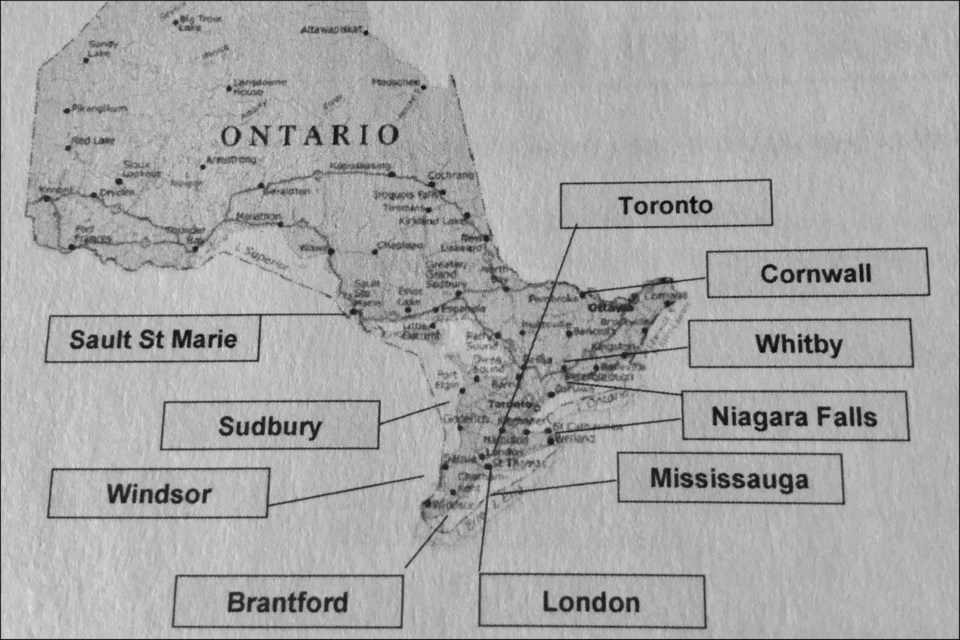Algoma Board of Health, the governing body of Algoma Public Health, is warning area politicians about new evidence linking Imperial Tobacco Canada Ltd. to lobbying campaigns against contraband tobacco.
The health board voted last night to ask Algoma municipalities to reject all motions received from tobacco companies or front groups that spike campaigns against illicit smokes with demands for a tobacco excise tax freeze or limits on regulation of tobacco products.
Imperial Tobacco Canada Ltd. is a wholly-owned subsidiary of British American Tobacco Plc., one of the world's five biggest tobacco companies with 55,000 employees in 44 factories in 41 countries.
In a recently leaked internal report prepared for its London-based parent, Imperial Tobacco Canada reveals that it's been quietly involved for years in lobbying campaigns by convenience-store and anti-contraband groups.
The secret report describes Project M&M, a 2012 campaign intended to "mobilize local governments to pressure for big government action" against illicit tobacco, with demands for an excise tax freeze piggybacked on the main message.
Listed as partners in Project M&M are the Canadian Convenience Store Association, the National Coalition Against Contraband Tobacco, the Ontario Chamber of Commerce, Fédération des Chambres de Commerce du Québec and the Canadian Taxpayers Federation.
The leaked 32-page document includes a map identifying 10 "strategic municipalities" to be targeted in Ontario: Sault Ste. Marie, Sudbury, Windsor, Brantford, London, Mississauga, Niagara Falls, Whitby, Cornwall and Toronto.
These municipalities were selected, the report says, because of their:
- proximity to illicit tobacco
- seizure activity
- internal sales data
- political weight
- likelihood of buy-in
The document also identifies 10 targeted municipalities in Quebec: Montreal, Gatineau, Chateauguay, Laval, St. Georges, Sherbrooke, Quebec City, Drummondville, Trois Rivieres and Saguenay.
An article published one month ago by the National Post pointed to other close ties between convenience-store organizations and the tobacco industry.
"In fact, there is other evidence of their close links to the industry, including at least three former tobacco-company executives who are now leaders in the Ontario, Quebec and national convenience-store associations," the Post's Tom Blackwell reported.
The leaked Imperial Tobacco report suggests that the "2012 lobbying campaign was no grassroots movement, and that the retail and contraband organizations have for years been used as surrogates by the cigarette giant to promote its own interests," Blackwell wrote.
Sales of illicit cigarettes are considered a major problem in Ontario, where a bag of 200 illegal "rollies" sells for as little as $10 to $15, compared to more than $80 for legally taxed smokes bought at a corner store.
A 2013 study of collected cigarette butts conducted by NIRIC Group for the Ontario Convenience Store Association found that 17.7 per cent of butts picked up in Sault Ste. Marie were contraband, compared to 30.1 per cent in Kitchener, 28.5 per cent in Barrie, 24.5 per cent in Sudbury, 20.9 percent in Thunder Bay, 18.7 per cent in Toronto, 18.1 per cent in Guelph and 11 per cent in North Bay.
The following is the full text of the resolution passed last night by the Algoma Board of Health:
*************************
Anti-Contraband Tobacco Campaign
Whereas information referenced from a 2012 slide deck by Imperial Tobacco Canada Ltd. (ITCL) demonstrates that the National Coalition Against Contraband Tobacco (NCACT) and the Ontario Convenience Store Association (OCSA) have worked on behalf of ITCL to convince Ontario municipalities of the importance of the contraband tobacco problem; and
Whereas this referenced information makes clear that the anti-contraband campaign pursued by the NCACT and the OCSA in Ontario is designed in part to block tobacco excise tax increases and regulation of tobacco products generally; and
Whereas contrary to tobacco industry messaging, impartial research by the Ontario Tobacco Research Unit at the University of Toronto has shown that tobacco excise tax increases do not lead to large increases in contraband; and
Whereas municipalities within the District of Algoma have previously passed smoke-free bylaws and support protection of the public from second-hand tobacco smoke.
Therefore be it resolved that Algoma Public Health requests all municipalities within the District of Algoma to explicitly reject motions from tobacco industry and/or its front groups and to call on the Ontario Ministry of Finance to; (a) raise tobacco excise taxes and (b) enhance enforcement activities designed to reduce the presence of contraband tobacco in Ontario communities.
Furthermore, that this resolution be shared with the Ministry of Finance, federal Members of Parliament, the Association of Local Public Health Units, Ontario Public Health Units, the federal Minister of Health and the Ontario Campaign for Action on Tobacco.
*************************
